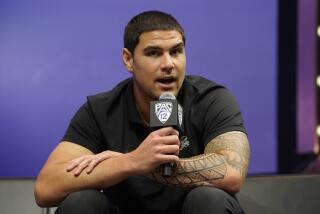FAMU hazing-death victim allegedly requested rite
Robert Champion got his chance for advancement on the night of Nov. 19, according to witnesses. Expected to become the lead drum major for Florida A&M; University’s celebrated Marching 100 band, Champion wanted to go through the hazing rituals that were the stepping stones to success and part of the group’s culture.
But instead of “crossing over,” as part of the hazing rite was called, Champion, 26, was pummeled so hard that he died of hemorrhagic shock caused by blunt-force trauma, according to the medical examiner’s report, part of a cache of documents released in the case Wednesday. Authorities said the autopsy found widespread contusions over Champion’s chest, shoulder, arms and back, along with extensive hemorrhaging in his muscles.
“It’s a respect thing, you know,” Jonathan Boyce told police of Champion’s request to be hazed that night in a bus parked outside a hotel in Orlando, Fla. “Well, he was wanting to do it all … all season.”
Boyce is one of the 13 band members charged in connection with Champion’s death and one of the 11 facing felony charges. A showpiece of the historically black college known as FAMU, the band performed at Super Bowls and presidential inaugurations. Its director was forced to retire under pressure and the band itself is on suspension for at least another year while officials try to fix whatever allowed things to go so horribly wrong.
On Wednesday, prosecutors released more than 1,500 pages of documents, including witness transcripts and medical reports, in connection with the incident. The band is portrayed as having a tough environment in which hazing rituals were common tests of leadership, according to various media reports of the cache.
In his interview with detectives, Boyce said Champion was due for advancement.
“Dr. [Julian] White was like, ‘Yeah, I made plans to make him the head for next year,’ ” Boyce said in an interview with a detective. White was the Marching 100’s band director who has since announced his retirement.
Ryan Dean, another band member facing criminal charges, said he was surprised to learn Champion wanted to be hazed.
It was “out of character for him just from the type of person he was,” Dean said, according to the reports of the documents. “He never approved of anything like that.”
Boyce said he asked Champion if he was game. “‘Do you still wanna do it?’ ” Boyce was quoted as saying in the released interview. “So he was like, ‘Yes.’ ”
At a news conference in Atlanta on Wednesday, Champion’s parents said they had a hard time believing their son volunteered to be hazed.
“He was murdered on that bus, and no one signs up for that,” Pam Champion said.
Christopher Chestnut, the Champion family’s attorney, said the school had failed to live up to its responsibility by allowing the hazing. “This institution needs to have a come-to-Jesus meeting.”
According to the reports, the hazing included the “hot seat” followed by “crossing over,” both on the band’s vehicle, called “Bus C.” Nov. 19 was the day of the last game of the season, the Florida Classic, against archrival Bethune-Cookman University, another historically black university in Daytona Beach, Fla. There were at least 15 people on the bus that night.
The “hot seat” involved getting kicked and beaten with drumsticks and bass drum mallets while covered with a blanket. Then came the “crossing over,” running from the front of the bus to the back as the others kicked and hit. Champion and the two others hazed that night were hit with “straps, hands, sticks and a big orange traffic cone,” according to the reported statements of witnesses.
Drum major Keon Hollis told detectives he went through the same hazing ritual as Champion the night he died. He said Champion was the next person to be hazed after him and seemed fine immediately afterward. Hollis said he gave Champion some water when he complained of thirst after the rite.
However, Champion soon said he was having trouble breathing, and an ambulance was called. At least one band member said he began chest compressions and tried to perform mouth-to-mouth resuscitation while the group waited for help.
ALSO:
Two female soldiers sue military over ban on combat roles
The Second Mile, charity founded by Jerry Sandusky, will dissolve
Best beaches in U.S.: California, Hawaii, New York take top 3 spots
More to Read
Sign up for Essential California
The most important California stories and recommendations in your inbox every morning.
You may occasionally receive promotional content from the Los Angeles Times.











